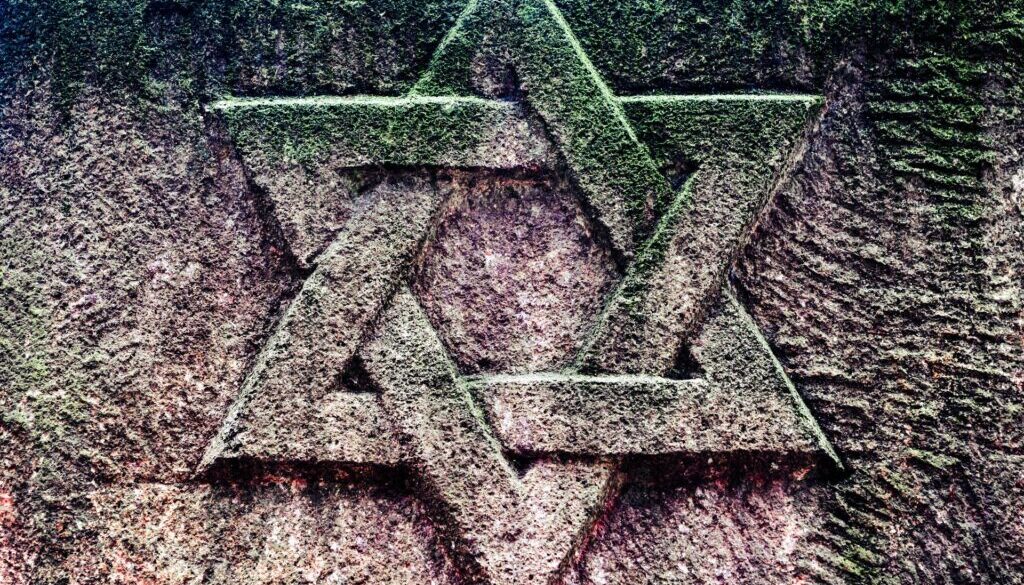One God or Less – Monotheism and the Quality of Mercy
During the darkest days of the pandemic, I binge-watched the slightly older series ‘Rome.’
‘Rome’ is a beautifully produced series which unfortunately only lasted two seasons. I am not a historian but I could tell that the producers had tried to faithfully reproduce Roman life, culture, politics and religion. Of course, there was a rather stereotypical representation of early Rabbinic (or Pharisaic) Jewish culture. I am pretty sure Pharisaic Jews did not wear prayer shawls in the way you’d encounter them in a 21st century suburban synagogue gift shop!
One of the most fascinating aspects was the depiction of Roman religion which was both moving and alienating. Throughout Rome’s narrow streets, there were icons and statues, with people sacrificing to them devoutly; each to their god. There was a scene in a patrician villa where the mater familias knelt before statues of the Lares – the household gods ensconced in a niche – beseeching the holy powers. It made the contrast with the Jews in their darkened synagogue with their invisible God all the more striking. I wonder what it must have felt like for those Jews to find their way through the winding back alleys of Rome, a heaving mass of freed men and slaves; cacophony of worship to a multitude of disparate and often morally unaffected deities.
For a 21st century person, it is hard to imagine either the pull or push of polytheism. Sure, there are Neo Pagan and Reconstructionist Heathen communities, but they are a tiny minority. For all intents and purposes – in our part of the world – we live in a monotheist universe. Like I said last week: God is everywhere, even the God you don’t believe in. I’d add to that a new maxim this week: Jews are people who believe in one God or less.
If monotheism is assumed, it is also more challenging to step outside of that paradigm and reflect on why monotheism matters. Deuteronomy – especially Parashat Shoftim – is determined to tell us that monotheism is the only legitimate religious path for Israel. (The archeological reality is a lot more complicated than that of course).
This brand of Deuteronomistic monotheism may not have mass appeal in a liberal, secular, pluralist society. But we can still operate from a paradigm that monotheism matters. That doesn’t mean that we have to devalue other spiritual paths or theologies; it just means that we build the case for monotheism, especially the ethical variety. Being able to articulate or at least appreciate why monotheism matters is a hallmark of the theological literacy I discussed last week – even if you fall on the ‘or less’ part of the ‘One God or less’ equation.
So why does monotheism matter? From the Torah’s perspective at least, why is worshiping one God seen as somehow ontologically superior than worshiping many? What we will examine now is not meant to cast aspersions on polytheistic theology in objective terms, but is meant as an apologetic and moral understanding of the monotheist position.
The hints can be found in a strange ‘asmachta’, joining of Torah verses, in the opening of the Parashah. The portion opens with the demands of establishing courts of law and pursuing a righteous justice system, unaffected by power differentials or vested interests. The Torah quotes Ruth Bader Ginsburg with the famous ‘tzedek tzedek tirdof’, ‘justice, justice you shall pursue’! (Deut. 16:20). (I’m being facetious of course—it must be that time of year).
The ’asmachta’ – interpretative joining – is to be found in the next verse, 21: ‘You shall not set up a sacred post…’ and then continues on with condemning out-and-proud idolatry: ‘If there is found among you…. A man or woman who has affronted your God the Eternal and transgressed the Covenant—turning to the worship of other gods and bowing down to them, to the sun or the moon or any of the heavenly host…’ Well, I do not need to finish the pasuk because it does not end well for this person: they are to be put to death.
It’s an abhorrent verse for us religious pluralists. It evokes images of the pillaging of beautiful temples, statues and monuments. It definitely carries a whiff which combines ‘The Handsmaid Tale’ and the Taliban, two social forces, fictional or actual, that are unfortunately resurgent in our world. (Lest you think we Jews are not capable of such wanton violence, I encourage you around Hanukkah time to read about the exploits of John/Yochanan Hyrcanos!)
Be what may, the Torah clearly connects justice with the singular God, and the uncompromising worship of that singular God. It’s a theme woven throughout the portion and the book. It is also a theme woven throughout the High Holidays; the most monotheist moment of the Jewish calendar. We turn in the Machzor to the Great Aleinu and the V’ye’etayu to see the intimate connection between the One God and a united, ethical humanity. Isaiah chapter 66:27 makes no bones about it: ‘all flesh shall come and worship Me.’ It’s a bold statement that makes the fine hairs on your arms stand on end. That kind of revved-up universalism is tantalizing, mesmerizing and unsettling.
But why? From the monotheist perspective, why is the condemnation of idolatry so utterly complete and is the one God principle hitched to the ethical imperative? The key is lies in the theological quantum jump Prophetic, post-Exilic Judaism made: a universal God is also the guarantor of universal rights. A God who is not confined to ethnos or locality is a God Who cares, loves and protects all God’s children. This is the charge of our Prophets: from the moment King Solomon inaugurates the Temple to the prophecies of an Isaiah or Micah to the morality tale of Jonah, to the rabbinic reimaginings of Abraham who would travel hither and tither in the name of God to bring justice and mercy (and convert a few people along the way in Charan. Those first Jews needed to come from somewhere!)
There is an important distinction to be made between idolatry (the worship of those things that are not God) and polytheism. I do not think they need to be necessarily linked. In fact, I think most acts of idolatry have nothing to do with gods at all and everything with the corruptions, obsessions and addictions to lifeless, soulless trappings of power—but that is a sermon for another day.
In the Biblical and Rabbinic mindset, monotheism codes for universal justice. It is the God from Deuteronomy chapter 10, the ‘ha’El ha’gadol, ha’gibor v’hanora’ (the great, mighty and awesome God), the Supreme Being, who reaches from the highest heavens down to the lowliest among us – the orphan, widow, impoverished and stranger – to offer uncompromising moral protection and the quality of mercy.
Even if you cannot affirm an actual belief in such a Supreme Being, or accept this God as a reality, there is still incredible power in appreciating the metaphor and rooting ourselves in the idea of God. Because the Jewish God, the Universal God, inhabits the quality of mercy and demands of us to do the same.
In closing, I am quoting Rabbi Beth Kissileff who writes the following in the magnificent ‘Women’s Torah Commentary’:
“It is only in this state of being a collective that a society can operate with justice. Through the totality of these laws, the parashah defines a just society—true kindness and mercy done to all—whether they are brothers, sisters, or enemies, living or dead, human or tree—so that all may find means of sustenance and peace. These values become societal values when they permeate all aspects of life.”
Is ethical monotheism a guarantor or a prerequisite of ethical conduct? Not necessarily. Monotheism has failed that litmus test all throughout human history to this day and certainly, there are righteous polytheists! But rooting ourselves in the power of that once bold idea, as we march closer and closer to proclaim the Divine ‘Melech al kol ha’aretz’, the Sovereign over all the world, gives us scope – as believers and as sceptics – to interrogate and embrace the ideas of universal justice, human equality and the mercy of the Divine that is meant to undergird it. Part of our theological literacy is being able to both critique and affirm that belief and carry it into the world, as a great light among the nations.




